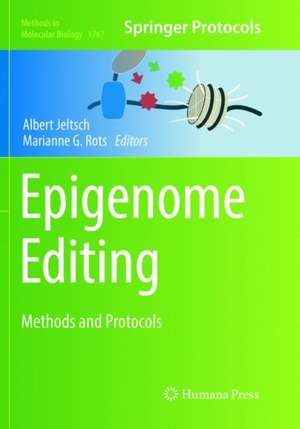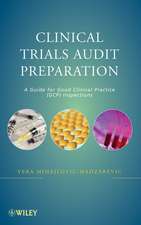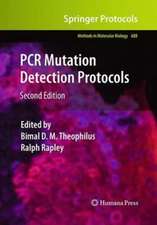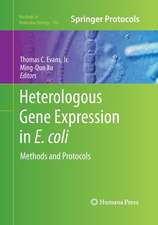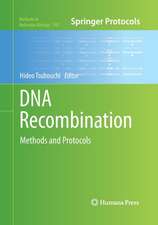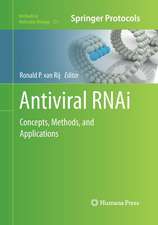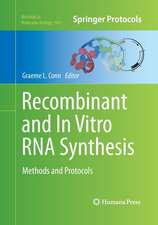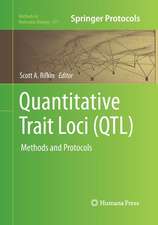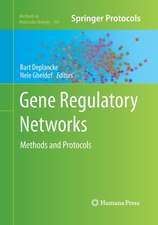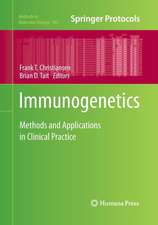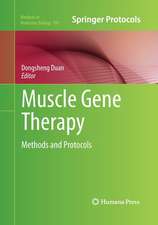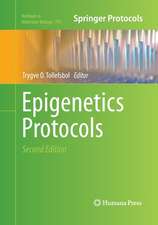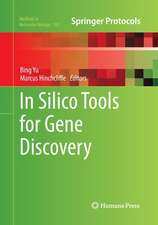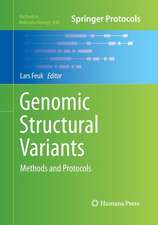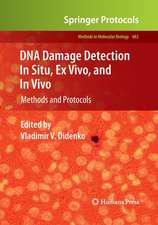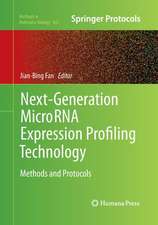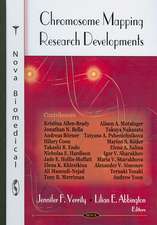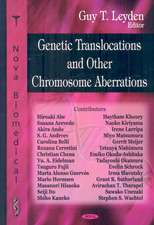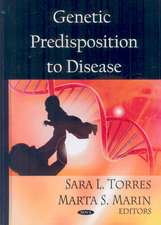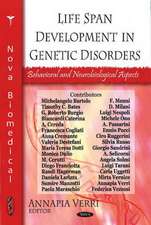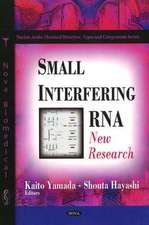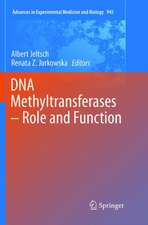Epigenome Editing: Methods and Protocols: Methods in Molecular Biology, cartea 1767
Editat de Albert Jeltsch, Marianne G. Rotsen Limba Engleză Paperback – 10 dec 2019
Authoritative and practical, Epigenome Editing: Methods and Protocols will be of great assistance to people new to the field but also to those already engaged, as epigenetic editing is still a relatively unexplored field with many issues to be resolved.
| Toate formatele și edițiile | Preț | Express |
|---|---|---|
| Paperback (1) | 741.83 lei 38-44 zile | |
| Springer – 10 dec 2019 | 741.83 lei 38-44 zile | |
| Hardback (2) | 1120.76 lei 6-8 săpt. | |
| Springer – 10 mar 2018 | 1120.76 lei 6-8 săpt. | |
| Springer Us – 17 aug 2024 | 1401.93 lei 6-8 săpt. |
Din seria Methods in Molecular Biology
- 9%
 Preț: 791.63 lei
Preț: 791.63 lei - 23%
 Preț: 598.58 lei
Preț: 598.58 lei - 20%
 Preț: 882.98 lei
Preț: 882.98 lei -
 Preț: 252.05 lei
Preț: 252.05 lei - 5%
 Preț: 802.70 lei
Preț: 802.70 lei - 5%
 Preț: 729.61 lei
Preț: 729.61 lei - 5%
 Preț: 731.43 lei
Preț: 731.43 lei - 5%
 Preț: 741.30 lei
Preț: 741.30 lei - 5%
 Preț: 747.16 lei
Preț: 747.16 lei - 15%
 Preț: 663.45 lei
Preț: 663.45 lei - 18%
 Preț: 1025.34 lei
Preț: 1025.34 lei - 5%
 Preț: 734.57 lei
Preț: 734.57 lei - 18%
 Preț: 914.20 lei
Preț: 914.20 lei - 15%
 Preț: 664.61 lei
Preț: 664.61 lei - 15%
 Preț: 654.12 lei
Preț: 654.12 lei - 18%
 Preț: 1414.74 lei
Preț: 1414.74 lei - 5%
 Preț: 742.60 lei
Preț: 742.60 lei - 20%
 Preț: 821.65 lei
Preț: 821.65 lei - 18%
 Preț: 972.30 lei
Preț: 972.30 lei - 15%
 Preț: 660.49 lei
Preț: 660.49 lei - 5%
 Preț: 738.41 lei
Preț: 738.41 lei - 18%
 Preț: 984.92 lei
Preț: 984.92 lei - 5%
 Preț: 733.29 lei
Preț: 733.29 lei -
 Preț: 392.60 lei
Preț: 392.60 lei - 5%
 Preț: 746.26 lei
Preț: 746.26 lei - 18%
 Preț: 962.66 lei
Preț: 962.66 lei - 23%
 Preț: 860.22 lei
Preț: 860.22 lei - 15%
 Preț: 652.64 lei
Preț: 652.64 lei - 5%
 Preț: 1055.50 lei
Preț: 1055.50 lei - 23%
 Preț: 883.87 lei
Preț: 883.87 lei - 19%
 Preț: 491.89 lei
Preț: 491.89 lei - 5%
 Preț: 1038.86 lei
Preț: 1038.86 lei - 5%
 Preț: 524.16 lei
Preț: 524.16 lei - 18%
 Preț: 2122.34 lei
Preț: 2122.34 lei - 5%
 Preț: 1299.23 lei
Preț: 1299.23 lei - 5%
 Preț: 1339.12 lei
Preț: 1339.12 lei - 18%
 Preț: 1390.26 lei
Preț: 1390.26 lei - 18%
 Preț: 1395.63 lei
Preț: 1395.63 lei - 18%
 Preț: 1129.65 lei
Preț: 1129.65 lei - 18%
 Preț: 1408.26 lei
Preț: 1408.26 lei - 18%
 Preț: 1124.92 lei
Preț: 1124.92 lei - 18%
 Preț: 966.27 lei
Preț: 966.27 lei - 5%
 Preț: 1299.99 lei
Preț: 1299.99 lei - 5%
 Preț: 1108.51 lei
Preț: 1108.51 lei - 5%
 Preț: 983.76 lei
Preț: 983.76 lei - 5%
 Preț: 728.16 lei
Preț: 728.16 lei - 18%
 Preț: 1118.62 lei
Preț: 1118.62 lei - 18%
 Preț: 955.25 lei
Preț: 955.25 lei - 5%
 Preț: 1035.62 lei
Preț: 1035.62 lei - 18%
 Preț: 1400.35 lei
Preț: 1400.35 lei
Preț: 741.83 lei
Preț vechi: 780.86 lei
-5% Nou
Puncte Express: 1113
Preț estimativ în valută:
141.99€ • 154.29$ • 119.35£
141.99€ • 154.29$ • 119.35£
Carte tipărită la comandă
Livrare economică 17-23 aprilie
Preluare comenzi: 021 569.72.76
Specificații
ISBN-13: 9781493992812
ISBN-10: 1493992813
Pagini: 482
Ilustrații: XIV, 482 p. 83 illus., 69 illus. in color.
Dimensiuni: 178 x 254 mm
Ediția:Softcover reprint of the original 1st ed. 2018
Editura: Springer
Colecția Humana
Seria Methods in Molecular Biology
Locul publicării:New York, NY, United States
ISBN-10: 1493992813
Pagini: 482
Ilustrații: XIV, 482 p. 83 illus., 69 illus. in color.
Dimensiuni: 178 x 254 mm
Ediția:Softcover reprint of the original 1st ed. 2018
Editura: Springer
Colecția Humana
Seria Methods in Molecular Biology
Locul publicării:New York, NY, United States
Cuprins
Editing the Epigenome: Overview, Open Questions, and Directions of Future Development.- Zinc Fingers, TALEs and CRISPR Systems: A Comparison of Tools for Epigenome Editing.- Designing Epigenome Editors: Considerations of Biochemical and Locus Specificities.- Generation of TALE-Based Designer Epigenome Modifiers.- Neuroepigenetic Editing.- Allele-Specific Epigenome Editing.- Key to Delivery: The (Epi-)Genome Editing Vector Toolbox.- CRISPR/dCas9 Switch Systems for Temporal Transcriptional Control.- Delivery of Designer Epigenome Modifiers into Primary Human T Cells.- Viral Expression of Epigenome Editing Tools in Rodent Brain Using Stereotaxic Surgery Techniques.- Stable Expression of Epigenome Editors Via Viral Delivery and Genomic Integration.- Purified-Protein Delivery to Activate an Epigenetically-Silenced Allele in Mouse Brain.- Non-Viral Methodology for Efficient Co-Transfection.- Chromatin Immunoprecipitation in Human and Yeast Cells.- Chromatin Immunoprecipitation and High Throughput Sequencing (ChIP-Seq): Tips and Tricks Regarding the Laboratory Protocol and Initial Downstream Data Analysis.- Generation of Whole Genome Bisulfite Sequencing Libraries for Comprehensive DNA Methylome Analysis.- Approaches for the Analysis and Interpretation of Whole Genome Bisulfite Sequencing Data.- Whole Genome Bisulfite Sequencing for the Analysis of Genome-Wide DNA Methylation and Hydroxymethylation Patterns at Single-Nucleotide Resolution.- Locus-Specific DNA Methylation Analysis by Targeted Deep Bisulfite Sequencing.- DNA Methylation Analysis by Bisulfite Conversion Coupled to Double Multiplexed Amplicon-Based Next-Generation Sequencing (NGS).- Cell-to-Cell Transcription Variability as Measured by Single Molecule RNA FISH to Detect Epigenetic State Switching.- Establishment of Cell Lines Stably Expressing dCas-Fusions to Address Kinetics of Epigenetic Editing.- Editing of DNA Methylation Using dCas9-Peptide Repeat and scFv-TET1 Catalytic Domain Fusions.- Chemical Inducible dCas9-Guided Editing of H3K27 Acetylation in Mammalian Cells.- Screening Regulatory Element Function with CRISPR/Cas9-Based Epigenome Editing.
Textul de pe ultima copertă
This detailed book explores the concepts and applications of epigenome editing, as presented by leading scientists in the field. Beginning with some general and topical reviews, the collection continues by covering the design of DNA-binding devices, optimization of the effector domains, readout of epigenome marks, and approaches for delivery at the cellular and organismal level. Written for the highly successful Methods in Molecular Biology series, chapters include introductions to their respective topics, lists of the necessary materials and reagents, step-by-step, readily reproducible laboratory protocols, and tips on troubleshooting and avoiding known pitfalls.
Authoritative and practical, Epigenome Editing: Methods and Protocols will be of great assistance to people new to the field but also to those already engaged, as epigenetic editing is still a relatively unexplored field with many issues to be resolved.
Caracteristici
Includes cutting-edge techniques for the study of epigenome editing Provides step-by-step detail essential for reproducible results Contains key implementation advice from the experts
